1st Grade The Scientific Method Resources
About 1st Grade The Scientific Method Resources
On Education.com, this page provides resources for teaching the scientific method to 1st-grade students. Educators and parents can access worksheets, lesson plans, and hands-on activities that introduce young learners to the basics of observation, experimentation, and conclusion drawing. These materials help make science engaging and accessible for early learners while fostering curiosity and critical thinking skills.
Explore a variety of educational resources including printable experiments, interactive demonstrations, and classroom activities designed specifically for 1st-grade exploration of the scientific method. Students can practice making predictions, observing results, and recording data through guided exercises that encourage systematic thinking. Using structured yet playful approaches, these materials make foundational science concepts both fun and educational.
Find practical teaching tools on Education.com that streamline lesson planning and classroom instruction for the scientific method. These resources provide step-by-step guidance for introducing scientific inquiry in ways that reinforce cognitive development and scientific thinking. With ready-to-use worksheets and activities, educators and parents can effectively support early science education and inspire a lifelong interest in discovery.
Explore a variety of educational resources including printable experiments, interactive demonstrations, and classroom activities designed specifically for 1st-grade exploration of the scientific method. Students can practice making predictions, observing results, and recording data through guided exercises that encourage systematic thinking. Using structured yet playful approaches, these materials make foundational science concepts both fun and educational.
Find practical teaching tools on Education.com that streamline lesson planning and classroom instruction for the scientific method. These resources provide step-by-step guidance for introducing scientific inquiry in ways that reinforce cognitive development and scientific thinking. With ready-to-use worksheets and activities, educators and parents can effectively support early science education and inspire a lifelong interest in discovery.















